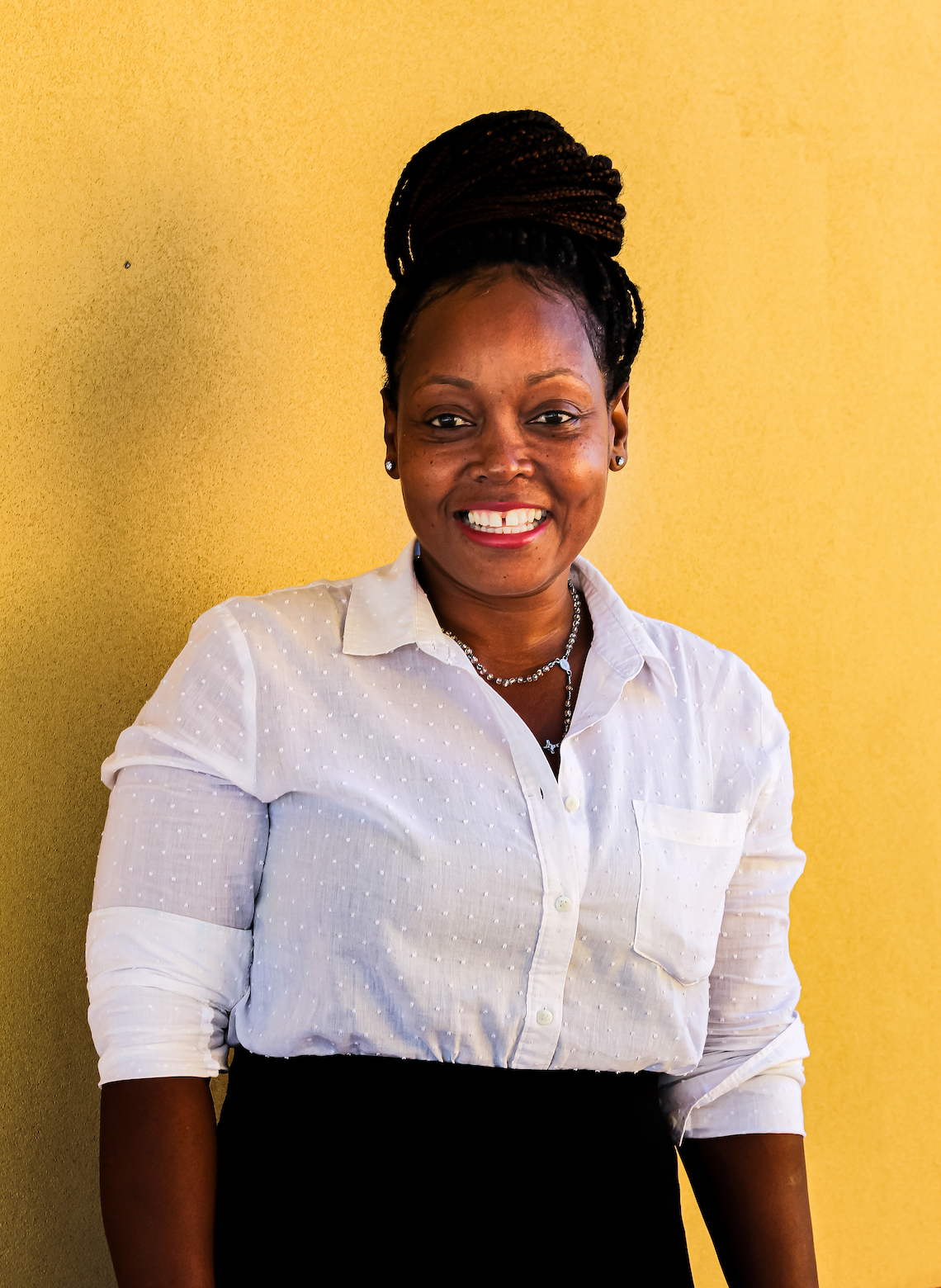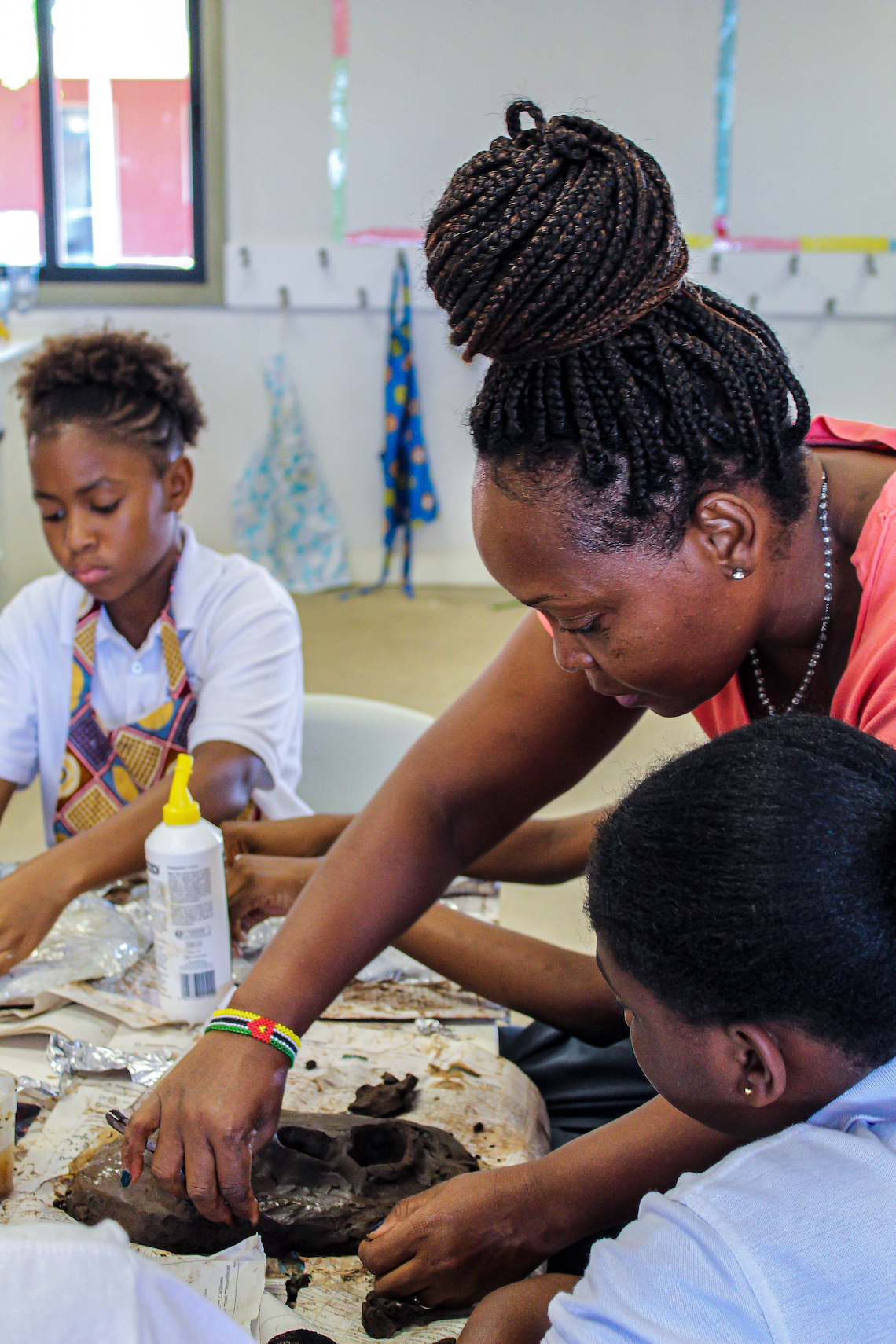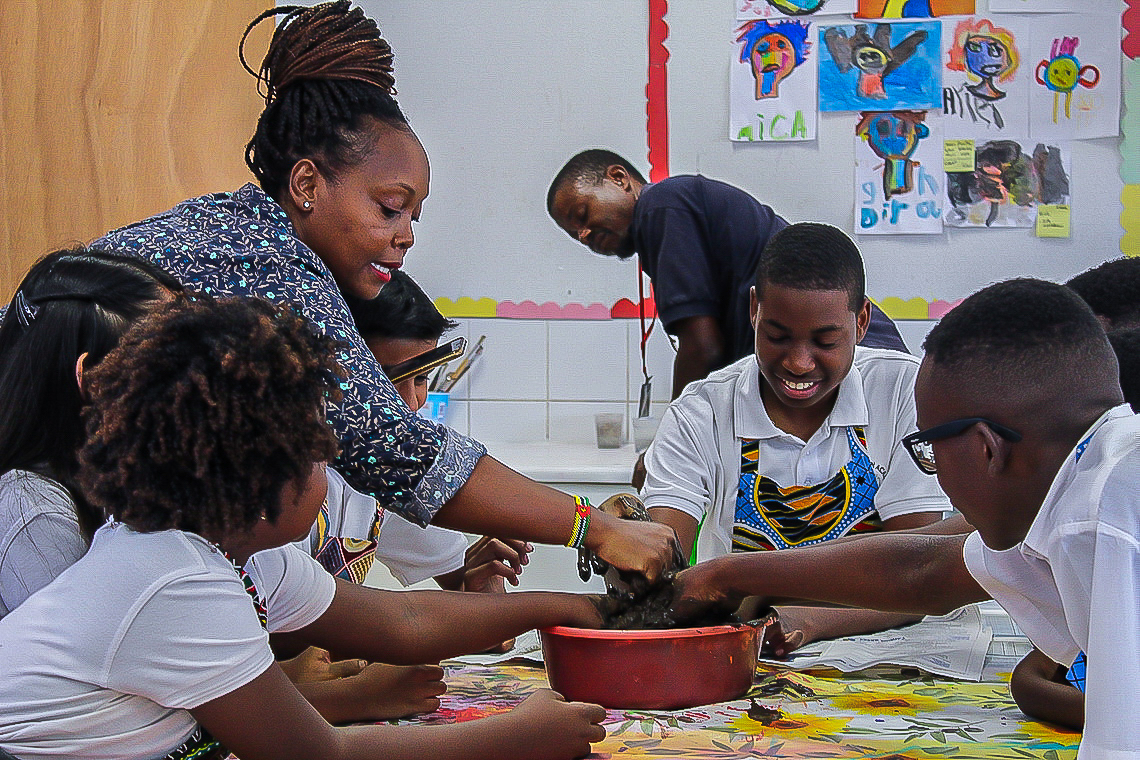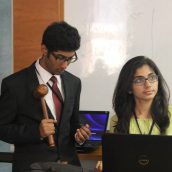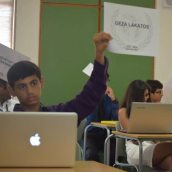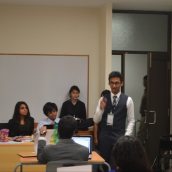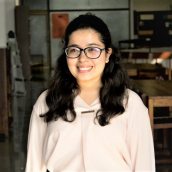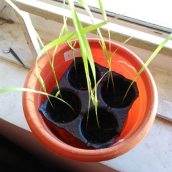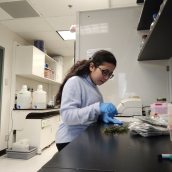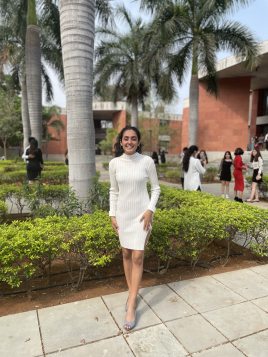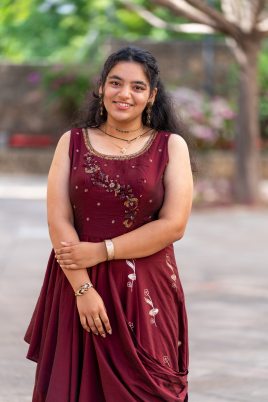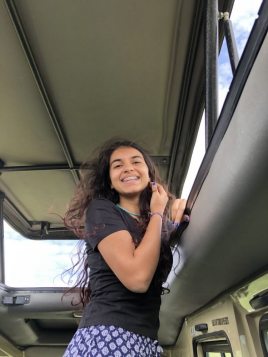Rosa Jorge: Encouraging expression through the arts
A new arrival at the Academy in Maputo, Rosa completed the Academies’ Teacher Preparation Programme (TPP) at the AKA Mombasa in December 2019. Calling it one of the most rewarding experiences of her life, she lauds the Problem-Based Learning (PBL) Sessions for pushing her to be a better teacher.
Looking back at her TPP journey, Rosa recounts, “I, personally, have seen myself grow as a teacher and a social individual. The experience has changed the way I approach the teaching and learning process. As teachers, it is possible to change the world through education – all we have to do is believe in that and go do it!”
Drama in the family
She began her now 20-year journey with drama from the nascent age of 14. When her brother and friends were taking up extra-curricular activities such as swimming and football, Rosa’s only interest was joining Mutumbelinhas, a local children’s theatre group. She credits her aunt, who ran the group, for helping her break away from her shy persona. “My hubsand put together a play called ‘Ziraldo’ based on the Brazilian writer's life. It was such a big change for me because I was a shy kid and through drama, I became a different person,” she recounts.
Since then, the stage has become her life. It is where she met her husband, who is a director of the Mbeu theatre group and a teacher at Universidade Eduardo Mondlane. It is also the field of work for her son, a theatrical producer and her sister, an actress.
Empowering students with confidence through arts and drama
She hit the ground running in Maputo taking on her role as the Academy’s Drama teacher in January 2020. One of Rosa’s passions include organising workshops promoting self-expression, believing these are key in providing different methods of communication – be it, art, movement, singing, or dialogue and bringing children out of their comfort zone in a safe space. Rosa explains, “Through these workshops, children simply react to the directive and break out of their shell, forgetting that they were shy in the first place.”
Drama goes beyond the stage for Rosa who has been bringing to the fore issues of local cultures and traditions. Over the past few weeks, she has invited many artists to speak about the ethnic groups of Nyau and Mapiko, whereby the children have been learning through the method of mask making and movement classes. Drama has always been more than just performance for Rosa who said, “...it is a very strong tool to build various capacities within young students. It sharpens their communicative, social, collaborative and emotional skills.”
Geared to take on the years to come, Rosa shared that she can already see the seeds of transformation taking root in some students. “I believe that my training in theatre supplemented by the International Baccalaureate (IB) curriculum will present the opportunity to pick up the diamonds in the rough and shine them up,” she explained. “In my opinion, it is important to have Drama as part of a balanced school curriculum in order to develop a socially, emotionally and culturally-aware individual.”
International Baccalaureate - Primary Years Programme
International Baccalaureate - Primary Years Programme
Junior School application form
Junior School application form
Senior School application form
Senior School application form
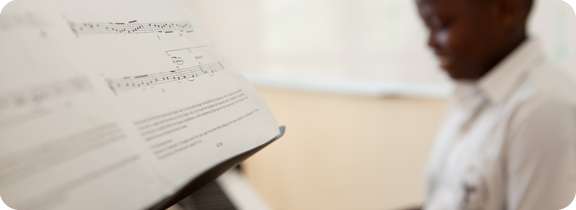
Co-curricular Programmes
Co-curricular programmes enable students to realise their potential in a variety of settings beyond the classroom. Students develop a sense of self-awareness and an understanding of school and community needs and opportunities. They also learn how to apply their gifts and skills to make a positive impact.
At the Academy, we believe in a balanced, rounded, comprehensive school experience. As this includes both academic and co-curricular experiences, we encourage our students to do their best both in and outside the classroom.
We will offer outstanding sports facilities that will include:
- swimming and diving pools
- cricket, soccer and hockey pitches
- basketball and volleyball areas
- tennis and squash courts
- dance studio
- gymnasium
- athletics tracks.
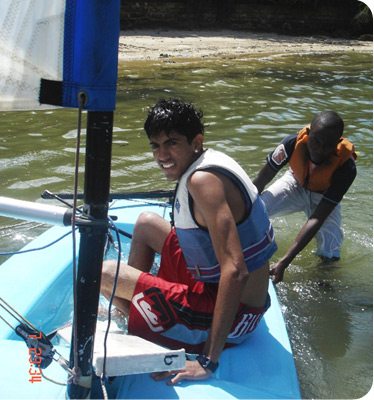 Children with special sporting gifts will be encouraged to develop their talents in every way. Children with special gifts in music, art or drama will similarly be encouraged through opportunities to practise and perform while at the Academy.
Children with special sporting gifts will be encouraged to develop their talents in every way. Children with special gifts in music, art or drama will similarly be encouraged through opportunities to practise and perform while at the Academy.
Our co-curricular programmes are clustered into three main streams, each with a different focus:
Creative Expression
Whether through visual or performing arts, this cluster engages students to think creatively and express their identities and thoughts aesthetically. Through theatre, art, music and drama, students learn to work together and infuse their projects with values and lessons from other parts of their schooling. Individual and collaborative creative projects emphasise growth and development through personal challenge, ultimately resulting in achievable personal goals.
Action
The student as a reflective practitioner is a basic tenet of the Action cluster. Through physical sport—both competitive and non-competitive—students are challenged in their physical growth, and learn values such as good sportsmanship, teamwork and ethical behaviour. We encourage them to extend themselves by trying different activities and working with teammates to pass on their knowledge. In line with developing the student as a whole, a healthy lifestyle complements and enhances academic achievement.
The Academies will be concerned with the whole of the human being—mind, body and spirit—and with the broad range of human aspiration—intellectual, moral, artistic, physical and spiritual. The fact that these are residential academies will contribute enormously to these broad objectives, encouraging students to identify more completely with the school, to help lead it and shape its environment.
The Academies will be concerned with the whole of the human being—mind, body and spirit—and with the broad range of human aspiration—intellectual, moral, artistic, physical and spiritual. The fact that these are residential academies will contribute enormously to these broad objectives, encouraging students to identify more completely with the school, to help lead it and shape its environment.
Citizenship
At the Academy, we encourage knowledge and understanding of humanity and civil society. Through their involvement in citizenship activities, students gain an understanding of the practical implications of their work and study. By collaborating with community groups on sustainable projects, they develop an appreciation for human rights and human dignity, and of how their actions impact the world around them.
To learn more about the Academy's programme, please visit the Academic Programme page.
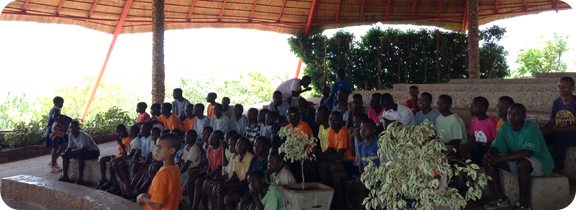
Community Links
The vision set out by His Late Highness Prince Karim Aga Khan IV is for each Academy to become an integral part of the greater community in which it resides. This value applies not only to the students but also to the teachers at each of the Academies.
This focus comes into play at the admissions stage, where potential students are chosen not only for their thirst for knowledge and intellectual merit, but also for having a high level of social awareness. This includes the desire to work towards and instigate positive change and the potential for leadership in community service.
Community service plays a large part in each of the levels of education offered at the Academies, which in turn allows for graduates who are civic-minded. In choosing the sites for each school, special attention is paid to not only what the area can offer the students but also what the Academy can offer the community.
While supporting students in developing an understanding of global issues, the Academies’ educational programmes also reflect great sensitivity to local languages, history, cultures and environment. Each school is committed to inspiring and empowering students to use their gifts for the betterment of humanity.
Creativity, activity, service
In choosing the International Baccalaureate programme, the Aga Khan Academies chose to incorporate the creativity, activity, service (CAS) component.
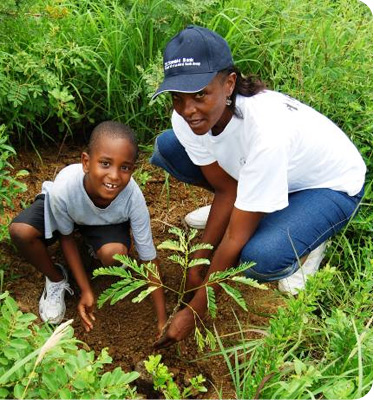
This integral programme is designed to create global citizens through active participation in and reflection upon experiences gained through a variety of creative endeavours, physical activities and community service projects.
Students develop a greater level of self-confidence, teamwork and leadership skills, and a sense of civic responsibility. They take part in sustainable projects that have real and lasting effects on the greater community. And they develop strength of character and an understanding of their ability to bring about change.
The CAS programme is valued for its power to transform not only the lives of students but also those with whom the students interact.
It also serves as a platform for interpersonal exchange, personal growth and greater understanding of the issues we face as a global community.
For more information on our CAS projects in action, visit our school websites.
Professional development outreach
Emphasis on community outreach and service is extended to the staff at each Academy as well, especially the teaching staff.
Each school will incorporate a Professional Development Centre (PDC), which will promote excellence in teaching on campus and strengthen the profession of teaching in the region as well.
"At the Academy, I feel part of a community. I am active in service projects that are making a real and lasting difference to people. I had no idea how important this would become for me."The Academy’s PDC supports excellence in teaching by promoting best practices in teaching and learning and by providing ongoing, collaborative training of Academy faculty as well as teachers and headteachers from neighbouring government, private and not-for-profit schools.
Faculty members are also enriched by opportunities to collaborate with colleagues across the globe and to teach abroad within the Aga Khan Academies network.
Rising Beyond: Inspiring Debate at the MUN
The simulation opened with an aesthetic dance performance showcasing culture that exists in great depth, as well as having Birad Yajnik speaking about global citizenship and leadership. The opening ceremony was followed by the first session of this simulation which consisted of students prepared for heavy debate.
The first session was preliminary and introduced the agendas and topics of debate of each committee to all the delegates. DISEC (Disarmament and International Security Committee) was engaged in debating over the international intervention in Civil Wars; ECOSOC (Economic and Social Council) debated over the impact of science, innovation and technology in achieving the millennium development goals; the JCC (Joint Crisis Committee) went back into history and debated over issues concerning World War II; and lastly, we had the Press Corps which interacted with each committee and their delegates of the conference, and got intensely rooted in the simulation, in order to provide for a very holistic experience of the whole event that took place.The second day still carried on with the same passion and enthusiasm. The second session started off with a morning crisis update, which proved to be quite a surprise to all the delegates. However, the debates in each committee over the crisis initiated slowly, and later escalated into deeper and effective discussions. The Press were involved in initiating Crisis in each committee which proved to be operative as it provoked heavy debates and discussions, further on the day. The second day proved to be an ecstatic and progressive one as it stimulated every mind, which resulted in exciting preparations for resolutions for the last day. The Delegate Dance was of course one of the highlights of the second day of the simulation.
Eventually came the final day of the simulation. The day proved to be brief but tense as delegates of each committee had to come up with effective resolutions according to their agendas. Every committee except for JCC (as it was historical) and DISEC succeeded in coming up with resolutions. Although DISEC failed to pass a resolution, it still instilled the sense of intrigue, passion and enthusiasm to overcome problems that are faced on the surface of the planet – each day and every moment.After having come up with a variety of resolutions, the time for closing the simulation had come. This time was much awaited by the delegates as it was also an award ceremony. Titles such as “Best Delegate”, “Outstanding Delegate”, “Best Photographer” and “Best Reporter” echoed the halls of the venue wherein the ceremony took place. After having a hearing of speeches of inspiration and accomplishment by the Security General and the Executive Board, as well as teachers and staff who functioned as a backbone to the simulation; and watching proud delegates walking towards their much deserving awards, came the time of saying a proud goodbye to the Aga Khan Academy, Hyderabad’s second edition of the Model United Nations conference. Now awaits the third edition which shall happen in Fall, 2015.
By Akanksha Dev
Rajan Thampi: Working for a cause
Rajan has played this role of connecting students to resources for his entire career. His work with Aga Khan Education Services began in 2008 in Maheshwaram Mandal, present day Telangana, where he implemented outreach programs for government schools and anganwadis. Rajan was in charge of programs like introducing life skills to high schoolers, leading health programs for adolescent girls, organising inter school sports competitions, and also training teachers for pre-primary and primary schools. Rajan’s other responsibility at that time, something he is still involved in, is creating and maintaining relationships with government officials.
A significant part of outreach depends on securing permission and getting recognition from government education bodies. Rajan played a major role in getting junior and senior schools recognised by the authorities. Rajan thanks the people who support the outreach department in these endeavors - the Academies Unit and members of the local board, Suleiman Hirani and Jayanthi.
Born in Kerala, the second of five siblings, Rajan grew up in Shakkarnagar, Telangana. Shakkarnagar is home to historical industrial era sites built under the Nizam. Most significant among these sites is the 1,600 square kilometer Nizam Sugar Factory that the town gets its name from. Designed as a model town, the place was built for factory employees and their families. “My father was an accountant in the factory,” remembers Rajan, “and we use to live in the accommodation provided by the factory in its colony.” Madhu Malancha high school, where Rajan went, was also created and funded by the factory. But India’s sugar trade has been in decline for decades, and in his lifetime Rajan has had to see the closure and privatisation of the massive factory. “Asia’s largest sugar factory is now shut,” he muses.
After completing senior school, Rajan gained a Bachelors in Commerce and started teaching at a private school. Finding his calling, Rajan then pursued a Bachelors in Education, focusing on social studies and education. Today he also has a Masters degree in social work under his belt. To Rajan, these degrees are tools to help others. Asked about the outreach department's future plans, his responses are ambitious and focused. “Reaching out to 31 districts of Telangana,” he says, “and to continue to share expertise through collaborative discussion forums for the government teachers are some of my plans.”
“Inner delight,” he says, “and the satisfaction obtained from working for a cause are the rewards I seek from my work." If the outreach program is a manifestation of the ethos behind service and stewardship, then Rajan exemplifies those ethos.
Sarah Keshvani (Class of 2018): using biology to tackle environmental challenges
Sarah’s love for the sciences flourished during the Diploma Programme (DP) at the Academy in Hyderabad. Through her extended essay, she found the opportunity to learn more about how biology can provide solutions to modern challenges faced in local communities. She decided to tackle the issue of water shortages and soil nutrient deficiencies hindering large scale rice cultivation in the state of Telangana, leading to reduced crop yields. Due to zinc deficiencies in the soil, farmers resort to using huge amounts of fertilisers, which further degrade soil quality.
Sarah’s research centred on hydroponics as a possible solution to this problem. Plants are grown in water-based, nutrient solutions instead of soil.
“This technique has recently garnered a lot of attention because experiments have shown that growth is more than doubled when compared to traditional methods of agriculture,” Sarah explained. “Nutrient uptake is more efficient, and farmers can control the type of nutrients the plant is exposed to, in order to enhance different features of the yield. The use of water in hydroponics is still much more efficient than how it is used in open paddy fields that need to be covered in water during certain times of the crop cycle.”
Sarah’s conclusions were positive. Rapid growth was observed and the flexibility to control the nutrient uptake played a huge role in optimal plant health. She realised that a closed system would have provided more accurate results, as the higher evaporation rates disturbed the pH levels. Overall though, she deduced this technique could definitely tackle the challenges faced by paddy farmers.
“The IB curriculum followed at the Academy has played a pivotal role in building many essential skills for university life,” Sarah reflected when asked how she has settled into this new phase. “The emphasis on academic integrity and independence have served me really well here. I was taught to think critically rather than blindly follow textbooks. Its skill-based learning approach, and connecting classroom learning to the real world, also prepared me well for higher education.”
Onwards and Upwards
Congratulations to the Class of 2022! We are so proud of you and cannot wait to see what you do next. As we welcome the new graduating class to our alumni community, we asked four distinct graduates from the Aga Khan Academies in Mombasa and Hyderabad about their journeys and aspirations.
Imra Dawoodani, AKA Hyderabad
Plans to join the University of California, Berkeley in the USA to study electrical engineering and computer science.
What drives you? What is your superpower?
The impact of experiences. Experiences have moulded the most intricate details of the world as I see it. Whether new, old, unexpected or a planned experience, each circumstance prompts the creation of a new approach within me, defining my ability to adapt to a multitude of situations. Sometimes it outlines my path, in other cases it intrigues me to look for one.
How did the Academy impact you?
It has been a journey. Exposing me to every emotion one could feel, pushing me forward every second because life never stops, and opening routes to a variety of opportunities, the Academy has thoroughly done its part in making me realise that I am the only one who can take a call for myself.
You are a new addition to the crayon box; what colour would you be and why?
Grey may not seem like the ideal choice, but it depicts my conflicted self. I am the one trying to figure out light and darkness, ebbs and flows, the balance between emotions and practicality. A simpler derivative to this conclusion would be my utterly annoying indecisiveness. I would be the one to mix sushi and dal, however horrendous it sounds, because I just cannot choose what I want to eat today.
Jacintha Thota, AKA Hyderabad
Plans to join the London School of Economics and Political Science in the UK to study politics and economics.
What drives you?
Two things that have driven me for a very long time are fascination and long-term goals. I am someone who just loves the idea of learning new things. Whatever I put my mind to is always driven by a sense of love, a sense of wonder, whether that's my academics or my extracurriculars. That fascination keeps me going. When it comes to long-term goals, I do know I want to work in the field of economics when it comes to equity or sustainability and that has shaped my interests and path.
How did the Academy impact you?
The most profound impact has been that it has shown me the world is so much bigger than the bubble that you grow up in. It brought together people from different cultures and socio-economic backgrounds. It has shaped my goals to be community-oriented and it has shown me that being a good person is having the right mindset and being tolerant of new ideas and new people.
What challenges did you face and how did you overcome them?
COVID-19 lockdowns and the kind of terror it put around the world when I was doing my Diploma Programme journey meant it was incredibly hard to stay motivated when people were suffering around you by the thousands. It left me with a sense of cynicism and feeling really demotivated. But actually, coming back to the Academy and being around people again reminded me just how much I valued this community. It definitely helped overcome the sense of dread I had started to feel during those 18 months or so.
Khushi Bajaria, AKA Mombasa
Plans to join the University of Miami in the USA to study health science (pre-med).
What challenges did you face and how did you overcome them? What was your best mistake?
I faced the challenge of making friends because of the way I felt the need to please my friends continuously. However, as I focused time on my goals, I eventually became part of a diverse group of friend groups. I also first thought it was a mistake that I ignored the warning from my personal project coordinator to not go ahead with my idea as it may impact my grades if I fail in it. However, as I believed in the impact it could make and communicated it with the right people, I was able to be successful and make a greater impact than expected.
How would you describe success and what do you hope to achieve in the next five years?
Success is a never-ending mountain with large rocks of joy and glee that help one stay stable, and numerous smaller rocks that keep pushing one to slip backwards in their journey of meeting their expectations. The soil of the mountain is then like family and friends that support and help piece part of this journey together to make success what it is. I hope to have completed my bachelor's degree in health sciences and my first year of medical school over the next five years. I also hope to have expanded my project (teaching Grade 5 to 7 students how to create an eco-friendly microscope). I hope by then, I shall have taught the developmental process in more than 15 schools in different countries through an international team.
Mishal Lalani, AKA Mombasa
Plans to join Middlebury College in the USA to study microbiology and biochemistry as well as geography and sociology.
What are your plans after graduation?
Firstly, I plan to sleep, have fun and just wind down all the stress over the past two years. I also look forward to and plan to spend time with my family before I leave for university in August, as well as the friends who live around me. Similarly, I hope to do a short internship at the Aga Khan Hospital in Mombasa just to grasp the healthcare environment as that is what I hope to pursue in the future.
What drives you? What is your superpower?
What has particularly always driven me is the community around me. Seeing the community improve when I help out or participate in different community projects makes me want to go the extra mile and do more.
How did the Academy impact you?
The Academy made me an all-rounded individual and made me a global citizen. Being the first cohort to go on the Student Exchange programme, I felt very privileged to be at the Academy and to have access to such amazing opportunities that will indeed be spoken about and recognised for the rest of my life. I made the most special memories at the Academy. Most importantly, the Academy taught me that no matter who I am or where I come from, I can make a change if I want to. This was the biggest lesson for me, and I believe it will take me far in life.
